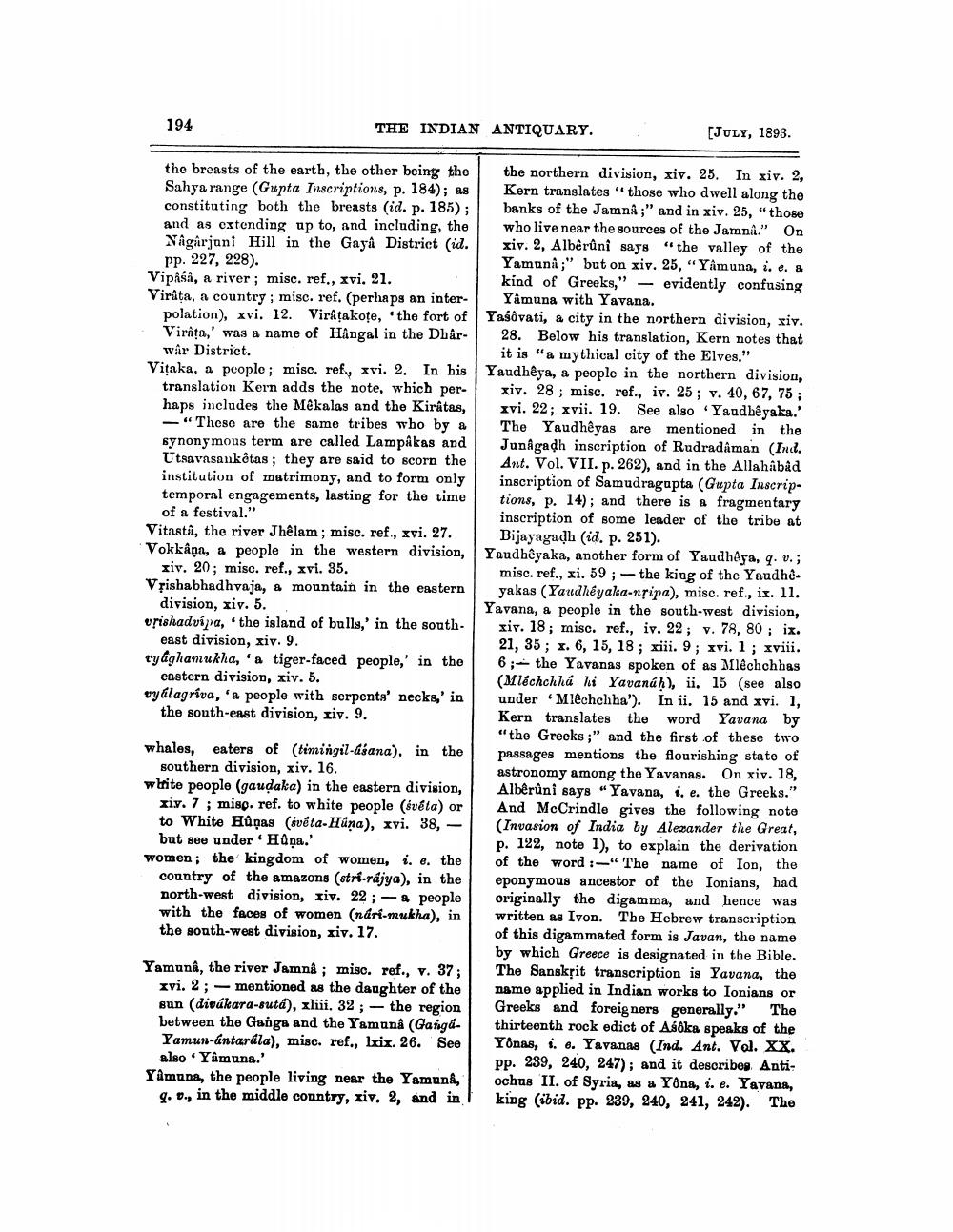________________
194
THE INDIAN ANTIQUARY.
[JULY, 1893.
the breasts of the earth, the other being the the northern division, xiv. 25. In xiv. 2, Sahya range (Gupta Inscriptions, p. 184); as Kern translates those who dwell along the constituting both the breasts (id. p. 185); banks of the Jamnå;" and in xiv. 25, "those and as extending up to, and including, the who live near the sources of the Jamna." On Nagarjuni Hill in the Gaya District id. xiv. 2, Albêrûni says "the valley of the pp. 227, 228).
Yamuna;" but on xiv. 25, "Yamuna, i.e. a Vipåsa, a river ; misc. ref., xvi. 21.
kind of Greeks," - evidently confusing Virâta, a country; misc. ref. (perhaps an inter- Yamuna with Yavana.
polation), xvi. 12. Viratakote, the fort of Yaśôvati, a city in the northern division, xiv. Virata,' was a name of Hangal in the Dhar- 28. Below his translation, Kern notes that war District.
it is "a mythical city of the Elves." Vitaka, a pooplo; misc. ref., xvi. 2. In his Yaudhêya, a people in the northern division, translation Kern adds the note, which per- xiv. 28; misc, ref., iv. 25; v. 40, 67, 75; haps includes the Mekalas and the Kirktas, xvi. 22; xvii. 19. See also Yaadhêyaka.' -“These are the same tribes ho by a The Yaudhêyas are mentioned in the synonymous term are called Lampákas and Junagadh inscription of Rudradaman (Ind. Utsavasanketas; they are said to scorn the Ant. Vol. VII. p. 262), and in the Allahabad institution of matrimony, and to form only inscription of Samudragupta (Gupta Inscriptemporal engagements, lasting for the time tions, p. 14); and there is a fragmentary of a festival."
inscription of some leader of the tribe at Vitastî, the river Jhêlam; misc. ref., xvi. 27.
Bijayagadh (id. p. 251). Vokkaņa, & people in the western division, Yaudhêyaka, another form of Yaudhéya, q. v.; xiv. 20; misc. ref., xvi. 35.
misc. ref., xi. 59; - the king of the Yaudhe. Vpishabhadhvaja, & mountain in the eastern yakas (Yaudhéyaka-nsipa), misc, ref., ix. 11. division, xiv. 5.
Yavana, a people in the south-west division, urishadvipa, the island of bully,' in the south. xiv. 18; misc. ref., iv. 22; v. 78, 80; ix. east division, xiv. 9.
21, 35; X. 6, 15, 18; xiii. 9; xvi. 1 ; xviii. tyághamukha, a tiger-faced people,' in the 6;- the Yavanas spoken of as Mléchchhas eastern division, xiv. 5.
(Mléchchha hi Yavanáh), ii. 15 (see also vydlagriva, 'a people with serpents' necks' in under "Mlêchchha'). In ii. 15 and xvi. 1, the south-east division, ziv. 9.
Kern translates the word Yavana by
"the Greeks ;" and the first of these two whales, eaters of timingil-hsana), in the passages mentions the flourishing state of southern division, xiv. 16.
astronomy among the Yavanas. On xiv. 18, wlite peoplo (gaudaka) in the eastern division, Albêrûni says "Yavana, i.e. the Greeks."
xix. 7 ; misp. ref. to white people (svéta) or And McCrindle gives the following note to White Hûņas (svéta-Húna), xvi. 38,- (Invasion of India by Alexander the Great, but see under Hûņa.'
p. 122, note 1), to explain the derivation women; the kingdom of women, i.e. the of the word :-“The name of lon, the
country of the amazons (stri-rajya), in the eponymous ancestor of the Ionians, had north-west division, xiv. 22; & people originally the digamma, and hence was with the faces of women (ndri-mukha), in written as Ivon. The Hebrew transcription the south-west division, ziv. 17.
of this digammated form is Javan, the name
by which Greece is designated in the Bible. Yamuna, the river Jamna ; miso. ref., v. 37; The Sanskrit transcription is Yavana, the
xvi. 2; - mentioned as the daughter of the name applied in Indian works to Ionians or Bun (divákara-sutá), zliji. 32 ; - the region Greeks and foreigners generally." The between the Ganga and the Yamuna (Ganga. thirteenth rock edict of Asoka speaks of the
Yamun-antardla), misc. ref., lxix. 26. See Yonas, i. e. Yavanas (Ind. Ant. Vol. XX. also Yamuna.'
pp. 239, 240, 247); and it describes AntiYamuna, the people living near the Yamuna, ochus II. of Syria, as a Yôna, i. e. Yavana,
q. o., in the middle country, xiv. 2, and int king (ibid. pp. 239, 240, 241, 242). The




